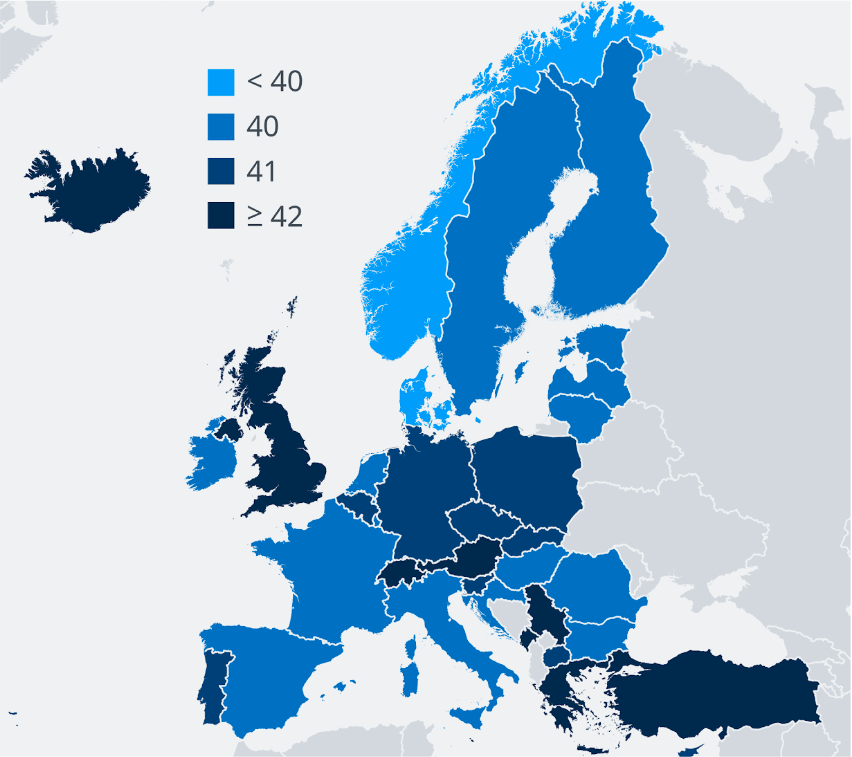The 4-day work week in Portugal: is it really happening?
Fewer work hours, same pay. Is the 4-day work week really happening in Portugal? This is what we know so far.
Forget about hybrid work or ping-pong tables at the office. Flexibility and work-life balance is what every employee really wants nowadays. That is why the 4-day week experiment is gaining followers around the world, and with good reason: data from Gartner reveals that 43% of workers are more productive when working to their own schedule.
Reducing working hours is not a new trend. Over the past 200 years, working hours have been slashed in half, down to around 40 hours per week. Now, what we have come to know as a “normal” workweek may be ripe for another major shift. Promising 4-day workweek trials show surprising benefits for workers and companies alike – but is it really happening any time soon?
What is a 4-day workweek?
A 4-day work week means employees work around 32-hour weeks, rather than the current 40 hours, for the same pay. The expectation is that, in exchange for being given the opportunity of working 80% of the time for 100% of the pay, workers will be more focused and productive.
Reducing work hours is not exactly a new concept. Until 1926, the standard US workweek lasted six days. Then, Henry Ford reduced the workweek at his company down to five days. He believed an extra day off would increase workers’ productivity and give workers more leisure time to spend more money. The workweek was later reduced to 44 hours and then again to the 40-hour week we know today.
AVERAGE WEEKLY HOURS OF WORK IN FULL-TIME JOBS - Source: DW
That was back in 1940. Since then, visionary leaders, courageous workers and revolutionary new technologies have redefined the concept of work - but we are likely just getting started. Studies point out that nearly half of the occupations in the United States could be automated within 20 years. This poses huge economic and social challenges. Many countries - Portugal included - are floating the idea of a 4-day work week as a response to greater productivity at work. Some areas of public service and a few private companies are already making headway and managers and workers alike seem happy with initial results. Could the future of work be doing less of it, but more efficiently?
What are the pros of a 4-day workweek?
Most workers react positively to the prospect of a 4-day work week, which means that they will effectively have one extra day to spend with family, children, to catch up on housework, to dedicate to personal projects, or simply to rest and recover. Like any other benefit, this is sure to increase motivation at work and means that workers can be more focused while they are at work.
As a result, workers on a 4-day workweek are likely to be more productive - or at least get the same amount of work done.
In a recent study by researchers at Cambridge and Oxford universities with over 70 companies and 3,000 employees, around 85% of organisations say they were “likely” or “extremely likely” to continue the four-day model after the trial period ends. Impressively, 95% of companies reported that productivity had either remained the same or had improved. In simple language, what this means is that less can be more. People were working 20% fewer hours, yet were sufficiently motivated to enable most of the participating organizations to achieve just as much productivity as with a traditional five-day workweek.
Also, happy workers means less turnover. The better the employees feel at work, the more loyal they’ll be to their employers. Millennials and generation Z workers, who make up the bulk of the workers - tend to prioritise work-life balance when choosing a place to work, namely companies that focus on mental health and wellbeing, as well as workplace flexibility.
One aspect of the traditional workweek that is frequently overlooked is how it promotes inequality, specifically gender inequality among parents. Childcare and housework specifically still tend to fall more on women. With a smaller work week, childcare needs would represent a lower financial burden for parents, allowing for both parents to work equally, for example.
What are the cons of a 4-day workweek?
The premise of a 4-day work week is to maintain or increase productivity while at work. In practice, this means doing more work in less time. While this may be viable for some people, it can be a contributing factor to stress or burnout for others. In the case that the workers aren’t able to increase their productivity to match the 5-day week, overtime may be needed to compensate for the gap.
Another key downside is that not all business models are compatible with a 4-day work week. In certain areas, additional workers will be necessary to cover the extra day off - offsetting the potential benefits for companies. That is the case with most industrial or service-oriented businesses. A generalized shift to 4-day weeks can also increase social inequality between knowledge workers and manual labour jobs. What will society look like when nurses work 5-day weeks and marketing workers wrap it up in just 4 days? And how will an already stretched national budget cope with the need to hire 20% extra workers?
As with anything new, there are still a lot of unknowns about the 4-day workweek and its consequences. But some countries have begun trials that could determine what work looks like in the next decades.
How the 4-day work week is being rolled out around the world
The 4-day workweek isn’t a new concept. It has been talked about at least since 2010 and has met with a fair share of criticism from the start. However, innovation is part of what keeps the world spinning, so although no country has officially adopted a 4-day work week yet, many countries are experimenting with it.
Currently, at least 18 countries are taking part in reduced work weeks. Countries like Japan, Spain, and Scotland all have ongoing government-funded programs to incentivise 4-day workweek trials. Dozens of companies in Australia, Canada, Germany, Ireland, South Africa, the United Kingdom, and the United States are giving the 4-day work week a go, with pilot trials of a few months.
The results were overwhelmingly positive: companies reported increased revenue and improved employee health and well-being and had a positive impact on the environment. And after the success of the initial pilots, more companies that together employ thousands of people are considering or are already implementing the same approach.
What about Portugal?
In Portugal, there have been a few companies experimenting with the 4-day workweek but a new, broad-scoped pilot is scheduled to start in 2023 and last for about 6 months. Currently, there are about 63 Portuguese companies interested in participating in the pilot, financed by the Portuguese Institute of Employment and Professional Formation.
This participation is voluntary and reversible, and the only requirement is that the total weekly hours are reduced. Some companies are going all in with the 32-hour model, but others are being a bit more conservative and reducing the work hours from 40 to 36. The results should be public in November.
BRIDGE IN answers all the questions about working in Portugal
Regardless of the hours in your workweek, setting up a company in Portugal is always a good idea. BRIDGE IN is the perfect partner for this venture. We provide Employer of Record services allowing you to hire teams in Portugal while being in compliance with all the local rules. We take care of the necessary steps involved in company formation and offer support as interim country managers should your business need it. Payroll, expenses, taxes, social security, insurance, legalities… you name it, BRIDGE IN can help you get started and get settled.
Get in touch with BRIDGE IN and let us tell you how we can help you.


